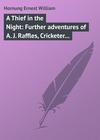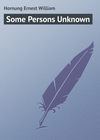Читать книгу: «Witching Hill», страница 7
"Not a syllable."
"Well – then – it's because I don't want Daddy to see it, for fear – "
" – it would grieve him?" I suggested as the end of his broken sentence. And I held my breath in the sudden hope that I might be right.
"For fear he tears it up!" the boy said harshly. "He did that once before, and this is the last I've got."
I made no comment, and there were no further confidences from Ronnie. So many things I wanted to know and could not ask! I could only hold my peace and Ronnie's hot hand, until it pinched mine in sudden warning, as the whole house lept under a springy step upon the stairs.
"Not a word to anybody, you know, Mr. Gillon?"
"Not one, to a single soul, Ronnie!"
But it was a heavy seal that was thus placed upon my lips; heavy as lead when I discussed the child with Uvo Delavoye; and that was almost every minute that we spent together for days to come.
For Ronnie became very ill.
In the beginning it was an honest chill. The chill turned to that refuge of the General Practitioner – influenza. Double pneumonia was its last, most definite stage; the local doctor made no mistake about that, and Coplestone appealed in vain against the verdict, before specialists who came down from London at a guinea a mile.
It was a mild enough case so far. The boy was strong and healthy, and capable of throwing off at least as much as most strong men. He was also a capital little patient – and Coplestone was a magnificent patient's father. He did not harry the doctors; he treated the elderly Scotch nurse like a queen; he was not always in and out of the sick-room by day, and he never set foot in it during the night. In the daytime Delavoye took him for long walks, and I would sit up with him at night until he started nodding in his chair.
The first night he said: "You must have some whisky, Gillon. I've got a new lot in." And when I said I seldom touched it – "I know you don't, in this house," he rejoined, with his hand for an instant on my shoulder. "But that's all right, Gillon! – Do you happen to know much about Dr. Johnson?"
"Hardly anything. You should try Uvo."
"Well, I don't know much myself; but I always remember that when the poor old boy was dying he refused the drugs which were giving him all the peace he got, because he said he'd made up his mind to 'render up his soul to God unclouded.' Now I come to think of it, there's not much analogy," continued Coplestone with a husky laugh. "But I know I'd rather do what Dr. Johnson wouldn't than go up clouded to my little lad if ever he – wanted me!"
And he took about a teaspoonful from a mistaken sense of hospitality, but no second allowance as the night wore on. The next night I was able to refuse without offending him; after that the decanter was never touched. Yet once or twice I saw the stopper taken out in sheer absence of mind, only to be replaced without flurry or hesitation.
Self-control? I never knew a man with more; it came out every hour that we spent together, and before long it was needed almost every minute. One day Delavoye dashed into the office in town clothes and with a tragic face.
"They want a second nurse! It's come to that already," he said, "and I'm going up about it now."
"But isn't that the doctor's job?" I asked, liking the looks of him as little as his news.
"I can't help it if it is, Gilly! I must lend a hand somehow or I shall crack up. It's little enough one can do, besides being day-nurse to poor old Coplestone, and this afternoon he's asleep for once. What a great chap he is, Gilly, and will be ever after, if only we can pull the lad through and then get them both out of this! But it's two lives hanging on one thread, and that cursed old man of mine trying all he knows to cut it! I'll euchre him, you'll see. By hook or crook I'll balk him – "
But white clouds were tumbling behind the red houses opposite, and Delavoye dashed out again to catch his train, like the desperate leader of a forlorn hope, leaving his dark eyes burning before mine and his wild words ringing in my ears.
Quite apart from the point on which he was never sane, he seemed to have lost the otherwise level head on which I had learnt to rely at any crisis; but Coplestone still kept his, and him I admired more and more. He still took his exercise like a man, refrained from harrying nurse or doctor, showed an untroubled face by the sick-bed, but avoided the room more and more, and altogether during the terrible delirious stages.
"If I were to stay there long," he said to me once, "I should make a scene. I couldn't help it. There are more things than one to cloud your mind, and I've got to keep mine unclouded all the time."
He kept it very nearly serene; and his serenity was not the numbness of despair which sometimes wears the same appearance; for I do not think there was a moment at which Coplestone despaired. He had much too stout a heart. There was nothing forced or unnatural in his manner; his feelings were not deadened for an instant, yet not for an instant would he give them rein. Only, our sober vigils cut deeper lines than his excesses before Christmas, and every night left him a hard year older.
We spent them all downstairs in his study. Neither of us was a chess-player, and I was all unversed in cards, but sometimes we played draughts or dominoes by the hour, as though one of us had been Ronnie himself. Often we talked of him, but never as though there were any question of his eventual recovery. Coplestone would only go so far as to bemoan the probability of an entirely lost hockey term, and his eye would steal round to the photograph of last year's hockey eleven at Ronnie's little school, in a place of honour on the mantelpiece, where indeed it concealed one of his own most heroic trophies.
Fitted and proportioned like half a hundred others on the Estate, that study of Coplestone's is one of those Witching Hill interiors that time cannot dismantle in my mind. It was filled with the memorials of a brilliant boyhood. There were framed photographs of four Cambridge crews, of two Eton eights, of the Eton Society with Coplestone to the fore in white trousers, of the "long low wall with trees behind it" and of the "old grey chapel behind the trees." There were also a number of parti-coloured caps under suspended oars, and more silver in the shape of cups, salvers, and engraved cigarette boxes than his modest staff of servants could possibly keep clean. Over the mantelpiece hung the rules of the Eton Society – under glass – with a trophy of canes decked with light blue ribbons.
"It all looks pretty blatant, I'm afraid," said Coplestone apologetically. "But I thought it would interest Ronnie and perhaps hound him on to cut me out. And now – "
He stopped, and I hoped he was not going on, for this was when Ronnie was at his worst and the second nurse had arrived.
"And now," said Coplestone, "the little sinner wants to be a dry-bob!"
I have not naturally a despondent temperament, but that night I for my part was wondering whether Ronnie would ever go to Eton at all. The delirious stage is always terrifying to the harrowed ignoramus watching by the bed; it is almost worse if one is downstairs, trying not to listen, yet doing little else, and without the nurse's calm voice and experienced eyes to reassure one. That was how I spent that night. The delirium had begun the night before, and been intermittent ever since. But Coplestone was not terrified; he kept both nerve and spirits like a hero. His thought for me brought a lump into my throat. Since I refused to leave him, I must take the sofa; he would do splendidly in the chair. He did better than I could have believed possible. He fell peacefully asleep, and I sat up watching his great long limbs in the lowered gas-light, but always listening while I watched.
Ronnie had not the makings of his father's fine physique. That was one of the disquieting features of the case. He was fragile, excitable, highly strung, as I felt his poor mother must have been before him. And he was tragically like his hidden portrait of her. I saw it as often as I was permitted a peep at Ronnie. What had she done amiss before she died? That was perhaps the chief thing I wanted to know about her, but after my pledge to Ronnie I felt unable even to discuss the poor soul with Delavoye. But she was only less continually in my mind than Ronnie himself, and to-night it seemed she was in his as well.
"O Mummie! Mummie – darling! My very, very, own little Mummie!"
God knows what had taken me upstairs, except the awful fascination of such wanderings, the mental necessity of either hearing them or knowing that they had ceased. On the stairs I felt so thankful they had ceased; it was in the darkened play-room, now a magazine of hospital appliances, kettles, bottles, and the oxygen apparatus; it was here I heard the joyous ravings of his loving little heart – here, on the threshold between his own two rooms, that I even saw him with his thin arms locked round the neck of the young nurse who had taken over the night duty.
She heard me. She came to the door and stood in silhouette against the cheerful firelight of the inner room. Its glow just warmed one side of her white cap and plain apparel, then glanced off her high white forehead and made a tear twinkle underneath.
"He thinks I'm his mother," she whispered – "and I'm letting him!"
I went out and pulled myself together on the landing, before sneaking back into the study without waking Coplestone.
In the morning I was dozing behind my counter without compunction, for the vigil had been an absolutely sleepless one for me, when the glass door opened like a clap of thunder, and in comes Delavoye rubbing his hands.
"The doctor's grinning all round his head this morning!" he crowed. "You may take it from me that there's a lot of life in our young dog yet."
"What's his temperature?"
"Down to a hundred and a bit. One thing at a time. They've scotched that infernal delirium, at all events."
"Since when?"
"Some time in the night. He's not talking any rot this morning."
"But he was fairly raving after midnight. I went up and heard him myself."
Uvo broke into exulting smiles.
"Ah! Gilly," said he, "but now we've got an angel abroad in the house. You can almost hear the beating of her wings!"
"Is that your own, Uvo?"
"No; it's a bit of a chestnut in these days. But it was said originally of the angel of death, Gilly, and I mean the opposite sort of angel altogether."
"The young nurse?"
"Exactly. She's simply priceless. But I knew she would be."
"You knew something about her, then?"
"Enough to bring her down on my own yesterday, and blow the doctor! But he's all for her now."
So, indeed, was I; for though a tear is nowhere more out of place than on the cheek of a trained nurse, yet in none is it such welcome evidence of human interest and affection. And there was the tender tact of the pretence to which she had lent herself before my eyes; even as a memory it nearly filled them afresh. Yet I could not speak of it to Coplestone, and to Delavoye I would not, lest I were led into betraying that which I had promised Ronnie to keep entirely to myself.
Nurse Agnes we all called her, but I for one hardly saw her again, save on the daily constitutional in grey uniform and flowing veil. The fact was that the improvement in Ronnie was so marked, and so splendidly sustained, that both his father and I were able to get to bed again. The boy himself had capital nights, and said he looked forward to them; on the other hand, for final sign of approaching convalescence, he became just a little difficult by day. Altogether it was no surprise to me to learn that two nurses would not be necessary after the second week; but I was sorry to hear it was Nurse Agnes who was going, and I thought that Uvo Delavoye would be sorrier still.
There was something between them. I felt sure of that. His rushing up to town to fetch her down, the absurd grounds on which he had pretended to justify that officious proceeding, and then his candid enthusiasm next day, when his protégé had shown her quality, all these were suspicious circumstances in themselves. Yet by themselves, at such a time, they might easily have escaped one's attention. It was a more than suspicious circumstance that brought the whole train home to me.
I was getting my exercise one mid-day when there was nothing doing; suddenly I saw Nurse Agnes ahead of me getting hers. Her thin veil flew about her as she stepped out briskly, but I was walking quicker still; in any case I must overtake her, and it was a chance of hearing more good news of Ronnie; for we never saw anything of her at night, except in firelit glimpses through the sick-room door. Evidently these were not enough for Uvo either; presently I espied him sauntering ahead, and when Nurse Agnes overtook him, instead of my overtaking her, he hardly took the trouble to lift his hat. But they walked on together at a pace between his and hers, while I waited in a gateway before turning back.
So that was it! I was delighted for Uvo's sake; I tried to feel delighted altogether. At any rate he had chosen a wonderful nurse, but really I had seen so little of the girl … if that was the word for her. In the apparent absence of other objections, I was prepared for a distinct grievance on the score of age.
However, she was going. That was something, and Uvo did not seem particularly cut up about it after all. But he brought the cab for her himself when the time came; he did not come in; but I saw him through the window as I sat at draughts once more with Coplestone, because it was a Saturday afternoon and Ronnie was not quite so well.
"This must be for Nurse Agnes," I said innocently. "It seems a pity she should go so soon."
"But she's not going yet!" cried Coplestone, upsetting the board. "She's going this evening; the other nurse told me she was. Of course I've got to see her before she goes!"
"I fancy that's her cab," said I, unwilling to give Delavoye away, but feeling much more strongly that Nurse Agnes had saved Ronnie's life.
"I didn't hear the bell," said Coplestone.
"Still, I believe that's Nurse Agnes on the stairs."
I had heard one creak, but only one, and the nurse was on tip-toe outside the door as Coplestone opened it. She might have been a thief, she seemed so startled.
"Why, nurse, what do you mean by trying to give me the slip?" he said in his hearty voice. "Do you know they all tell me you've saved my little chap's life, and yet I've hardly seen you all the time? You'd always fixed him up for the night by the time I'd finished dinner, and I've been so late in the morning that we've kept on missing each other at both ends. You've got to spare me a moment now, you know!"
But Nurse Agnes would only stand mumbling and smiling in the half-lit hall.
"I – I mustn't lose my train," was all I heard.
And then I realised that even I had only heard her voice once before, and that now it did not sound the same voice. It was not meant to sound the same – that was why – I had it in a flash. And in that flash I saw that Nurse Agnes had been keeping out of our way all these days and nights, keeping us out of her way by a dozen tacit little regulations which had seemed only proper and professional at the time.
But a fiercer light had struck Coplestone like a lash across the eyes. And he started back as though stung and blinded, until Nurse Agnes tried to dart past the door; then his long arm shot out, and I shuddered as he dragged her in by hers.
"You!" he gasped, and his jaw worked as though he had been knocked out in the ring.
"Yes," she said coolly, facing him through her veil; "and they're quite right – I've saved your boy for you. Do you mind letting me go?"
I forced my way past the pair of them, and rushed out to Delavoye waiting with the cab.
"Who is she? Who on earth is this nurse of yours?" I cried without restraint.
He drew me out of earshot of the cab-man.
"Has Coplestone spotted her?"
"This very minute – but who is she?"
"His wife."
"I thought she was dead?"
"No; he divorced her three years ago."
"Who told you?"
"Ronnie."
"And you never told me!"
"I promised him I wouldn't tell a soul."
The little rascal! He had bound us both; but there was a characteristic difference as between Delavoye and me, and the feelings that we inspired in that gallant little heart. Whereas I had surprised its secret, Ronnie had confided in Uvo of his own free will and accord.
"And it was he who begged me to bring her, Gilly, when he was at his worst! He said it was his one hope – that she could pull him through – that he knew she could! So I found her, and she did. She wasn't really a nurse, but she was his mother; she was his Angel of Life."
"Will she be forgiven?" I asked, when we had looked askance at the study windows, that gave us back only the wavering reflection of shrubs and of the chimneys opposite.
"Will she forgive?" returned Uvo sardonically. "It's always harder for the one who's in the wrong, and there's always something to be said for him or her!"
"Does she know that her husband needs to be saved as well?"
"Hush!" said Delavoye. The door had opened. Coplestone came out upon the step, and stood there feeling in his pockets.
I held my breath; and the only creature who counted just then, in all that road of bleak red houses, and in all the wintry world beyond, was the great shaken fellow coming down the path.
"You might give this to the cabby," said he, filling my palm with loose silver. "Just tell him we shan't want him now!"
CHAPTER VI
Under Arms
It must have been in my second year of humble office that the burglary scare took possession of Witching Hill. It was certainly the burglars' month of November, and the fogs confirmed its worst traditions. On a night when the street lamps burst upon one at the last moment, like the flash of cannon through their own smoke, a house in Witching Hill Road was scientifically entered, and the silver abstracted in a style worthy of precious stones. In that instance the thieves got clear away with their modest spoil. It was as though they then made a deliberate sporting selection of the ugliest customer on the Estate. Their choice fell upon a Colonel Arthur Cheffins, who not only kept fire-arms but knew how to use them, and gave such an account of himself that it was a miracle how the rascals escaped with their lives.
The first I heard of this affair was a volley of gravel on my window at dead of night. Then came Uvo Delavoye's voice through the fog before I quite knew what I was doing at the open window. Colonel Cheffins lived in the house opposite the Delavoyes', where he had lately started a cramming establishment on a small scale; and on his rushing over the road to the rescue, at the first sound of the fusillade, poor Uvo had himself been under fire in the fog. The good colonel was in a great way about it, I gathered, although no harm had been done, and it was only one of the pupils who had loosed off in his excitement. But would I care to come along and inspect the damage then and there? If so, they would be glad to see me, and as yet there was whisky for all comers.
I turned out instantly in my dressing-gown and slippers, found Uvo shivering in his, and raced him to the scene. It took some finding in the fog, until the lighted hall flashed upon us like a dark lantern at arm's length. In the class room at the back of the house, round the gas fire which obtained in all our houses, pedagogue and pupils were still telling their tale by turns and in chaotic chorus. Their audience was smaller than I expected. A little knot of unsporting tenants seemed more disposed to complain of the disturbance than to take up the chase; but indeed that was hopeless in the fog and darkness, and before long Uvo and I were the only interlopers left. We remained by special invitation, for I had made friends with the colonel over the papering and painting of his house, while Uvo had just shown himself a would-be friend indeed.
"It's a very easy battle to reconstruct," said the crammer at the foot of his stairs. "I was up there on the landing when I took my first shot at the scoundrels. You'll find it in the lower part of the front door. One of them blazed back, and there's the hole in the landing window. I had last word from the mat, and I've been looking for it in the gate, but I begin to hope we may find a drop or two of their blood instead to-morrow morning."
Colonel Cheffins was a little bald man with a tooth-brush moustache, and bright eyes that danced with frank delight in the whole adventure. He looked every inch the old soldier, even in a Jaeger suit of bedroom overalls, and I vastly preferred him to his two young men; but scholastic connections are not formed by picking and choosing your original material. Delavoye and I, however, made as free as they with the whisky bottle as a substitute for adequate clothing, and the one who had nearly committed manslaughter had some excuse in his depression and remorse.
"If I'd hit you," he said to Uvo, "I'd have blown my own silly brains out with the next chamber. I'm not kidding. I wouldn't shoot a man for twenty thousand pounds!"
And he shuddered into the chair nearest the glowing lumps of white asbestos licked by thin blue flames.
"God bless my soul, no more would I!" cried the crammer heartily. "I aimed low on purpose not to do more than wing them; there's my bullet in the door to say so, whereas theirs fairly whistled past my head on its way through that upstairs window. They're a most desperate gang of sportsmen, I assure you."
"There's certainly something to be said for keeping a revolver," observed Uvo, eyeing the brace now lying on the cast-iron chimneypiece.
"Do you mean to say you haven't got one?" cried Colonel Cheffins.
"I do. I wouldn't keep one even out in Egypt. I hate the beastly things," said Uvo Delavoye.
"But why?"
"Oh, I don't know. There's something so uncanny about them. They lie so snug in your pocket, and you needn't even take them out to send yourself to Kingdom Come!"
"Why yourself, Mr. Delavoye?"
"You never know. You might go mad with the beastly thing about you."
"God bless my soul!" cried the colonel, with cocked eyebrows. "You might go mad while you're shaving, and cut yourself too deep, for that matter!"
"Or when you're waiting for a train, or looking out of a window!" I put in, to laugh Uvo out of the morbid vein which I understood in him but others might easily misconstrue. I could see the two young pupils exchanging glances as I spoke.
"No," he replied, laughing in his turn, to my relief; "none of those ways would come as easy, and they'd all hurt more. However, to be quite serious, I must own it isn't the time or place for these little prejudices against the only cure for the present epidemic. And yet for my part I'd always rather trust to one of my Soudanese weapons, with which you couldn't have an accident if you tried."
Over the way, his own rooms were freely hung with murderous trophies acquired in the back-blocks of the Nile; but I felt more and more that Uvo Delavoye was wilfully misrepresenting himself to these three strangers; and the best I could hope was that a certain dash of sardonic gaiety might lead them to suppose that it was all his chaff.
"Well," said the colonel, "if those are your views I only hope you haven't many "valuables" in the house."
"On the contrary, colonel, everything we've got over there is a few sizes too big for its place, and our plate-chest simply wouldn't go into the strong-room of the local bank. So where do you think we keep it?"
"I've no idea."
"In the bathroom!" cried Uvo Delavoye, with the shock of laughter which was the refreshing finish of some of his moodiest fits. But you had to know him to appreciate his subtle shades, especially to separate the tangled threads of grim fun and gay earnest, and I feared that the gallant little veteran was beginning to regard him as a harmless lunatic. A shake of his bald head was all his comment on the statement that moved Delavoye himself to sudden mirth. And on the whole I was thankful when the return of a man-servant with a nervous constable, grabbed out of the fog by a lucky dip, provided us with an excuse for groping our way across the road.
"What on earth made you talk all that rot about revolvers?" I grumbled as we struck his gate.
"It wasn't rot. I meant every word of it."
"The more shame for you, if you did; but you know very well you don't."
"My dear Gilly, I wouldn't live with one of those nasty little weapons for worlds. I – I couldn't, Gilly – not long!"
He had me quite tightly by the hand.
"I'm coming in with you," I said. "You're not fit to be alone."
"Oh, yes, I am!" he laughed. "I haven't got one of those things yet, and I shall never get one. I'd rather thieves broke in and stole every ounce of silver in the place."
So we parted for what was left of the night, instead of turning it into day as we often did with less excuse; and for once my powers of sleep deserted me. But it was not the attempted burglary, or any one of its sensational features, that kept me awake; it was the lamentable conversation of Uvo Delavoye on the subject of fire-arms, and that no longer as affecting other minds, but as revealing his own. I had often heard him indulge his morbid fancies, but never so gratuitously or before strangers. To me he could and would say anything, but of late he had been less free with me and I more anxious about him. He had now been over eighteen months on the shelf. That was his whole trouble. It was not that he was ever seriously ill, but that he was always well enough to worry because he was no better or fitter for work. His mind raced like an engine, and the futile wear and tear was beginning to tell on the whole machinery. To be sure, he had written a little in a desultory way, but I never thought his heart was in his pen, and his fastidious taste was a deterrent rather than a spur. Yet he railed about the bread of idleness, said a man should be fit or dead, and that his mother and sister would be better off without him. Those ladies were again from home, and the fact did not make it easier to dissociate such sayings from an unhealthy horror of loaded revolvers.
So you may think what I felt the very next evening – which I did insist on spending at No. 7 – when the distasteful conversation was renewed and developed to the point of outrage. Daylight and less fog had failed to reveal any trace whatever of the thieves, and it became evident that the colonel's moral victory (he had lost a few spoons) was also a regrettably bloodless one. I saw no more of him during a day of vain excitement, but at night his card was brought up to Uvo's room, and the old fellow followed like a new pin.
I was in those days none too nice about my clothes, and both of us young fellows were more or less as we had been all day; but the sight of the dapper coach in his well-cut dinner jacket, with shirt-front shining like his venerable pate, and studded with a couple of good pearls, might well have put us to the blush. Under his arm he carried a big cigar-box, and this he presented to Delavoye with a courtly sparkle.
"You rushed to our aid last night, Mr. Delavoye, and we nearly shot you for your pains!" said the colonel. "Pray accept a souvenir which in your hands, I hope, and in similar circumstances, is less likely to end in so much smoke."
Uvo lifted the lid and the gas-light flashed from the plated parts of a six-chambered revolver with a six-inch barrel. It was one of the deadly brace that we had seen on the colonel's chimneypiece in the middle of the night.
"I can't take it from you," said Delavoye, shrinking palpably from the pistol. "I really am most grateful to you, Colonel Cheffins, but I've done nothing to deserve such a handsome gift."
"I beg to differ," said the colonel, "and I shall be sorely hurt if you refuse it. You never know when your turn may come; after your own account of that plate-chest, I shan't lie easy in my bed until I feel you are properly prepared against the worst."
"But my poor mother would rather lose every salt-cellar, Colonel Cheffins, than have a man shot dead on her stairs."
"I shouldn't dream of shooting him dead," replied the colonel. "I shouldn't even go as far as I went last night, if I could help it. But with that barrel glittering in your hand, Mr. Delavoye, I fancy you'd find it easier to keep up a conversation with some intrusive connoisseur."
"Is it loaded?" I asked as Uvo took the weapon gingerly from its box.
"Not at the moment, and I fear these few cartridges are all I can spare. I only keep enough myself for an emergency. I need hardly warn you, by the way, against pistol practice in these little gardens? It would be most unsafe with a revolver of this calibre. Why, God bless my soul, you might bring down some unfortunate person in the next parish!"
I entirely agreed, but Delavoye was not attending. He was playing with the colonel's offering as a child plays with fire, with the same intent face and meddlesome maladroitness. It was a mercy it was not loaded. I saw him wince as the hammer snapped unexpectedly; then he kept on snapping it, as though the sensation fascinated ear or finger; and just as I found myself enduring an intolerable suspense, Uvo ended it with a reckless light in his sunken eyes.
"I'm a lost man, Gilly!" said he, with a grim twinkle for my benefit. "I was afraid I should be if I once felt it in my paw. It's extraordinarily kind of you, Colonel Cheffins, and you must forgive me if I seem to have been looking your gift in the barrel. But the fact is I have always been rather chary of these pretty things, and I must thank you for the chance of overcoming the weakness."
His tone was sincere enough. So was the grave face turned upon Colonel Cheffins. But its very gravity angered and alarmed me, and I was determined to have his decision in more explicit terms.
"Then the pistol's yours, is it, Uvo?" I asked, with the most disingenuous grin that I could muster.





















